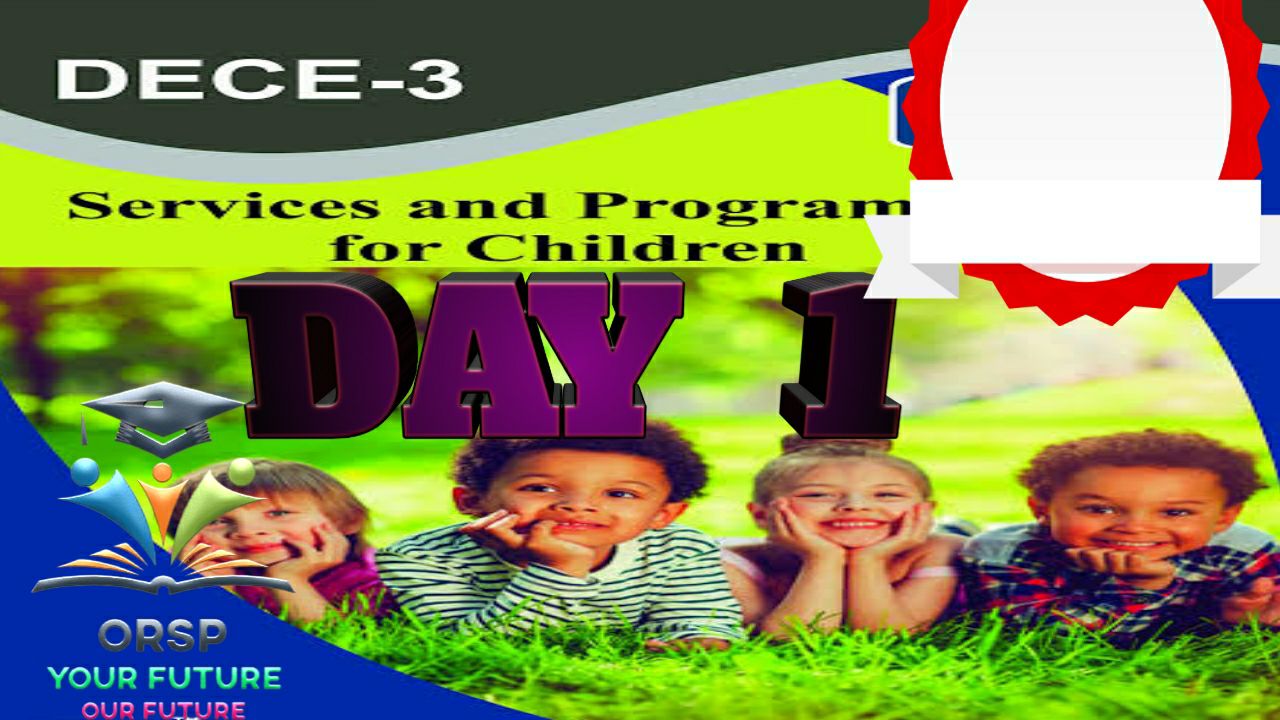DECE3 Unit 1 Solution(IGNOU)(HIN/ENG)-ORSP
Welcome To
Odisha Regional Study Point
We Allows the best competitive exam preparation for SSC,BANKING, RAILWAY &Other State Exam(CT, BE.d) DECE(IGNOU) In ଓଡ଼ିଆ Language…
Why opt ORSP?
✅Daily Free Live class
✅Daily Free practice Quiz
✅FREE Live Tests Quiz
✅Performance Analysis
✅All Govt Exams are Covered
Join With us As per Schedule
And
Happy Learning…
Thank You
ORSP
(9502052059)

DECE3 Unit 1 Solution(IGNOU)(HIN/ENG)-ORSP
The aim of Early Childhood Care and Education is to facilitate optimum development of the child’s full potential and lay the foundation for all round development and lifelong learning. While parents and home have the main responsibility of the welfare of the child, a strong partnership between the community and the ECCE centres is important for the well-being of the child and in achieving the following objectives.
Broad objectives of the Early Childhood Care and Education programme are to:
- Ensure each child is valued, respected, feels safe and secure and develops a positive self-concept
- Enable a sound foundation for physical and motor development of each child- as per each child’s potential
- Imbibe good nutrition routines, health habits, hygiene practices and self-help skills
- Enable children for effective communication and foster both receptive and expressive language
- Promote development and integration of the senses
- Stimulate intellectual curiosity and develop conceptual understanding of the world around by
- providing opportunities to explore, investigate and experiment
- Enhance development of pro-social skills, social competence and emotional well being
- Develop sense of aesthetic appreciation and stimulate creative learning processes.
- Imbibe culturally and developmentally appropriate behaviour and core human values of respect and love for fellow human beings.
- Enable a smooth transition from home to ECCE centre to formal schooling
- Enhance scope for overall personality development
बचपन की देखभाल और शिक्षा का उद्देश्य बच्चे की पूर्ण क्षमता के अनुकूलतम विकास को सुविधाजनक बनाना और सर्वांगीण विकास और आजीवन सीखने की नींव रखना है। जबकि माता-पिता और घर में बच्चे के कल्याण की मुख्य जिम्मेदारी होती है, समुदाय और ECCE केंद्रों के बीच एक मजबूत साझेदारी बच्चे की भलाई और निम्नलिखित उद्देश्यों को प्राप्त करने के लिए महत्वपूर्ण होती है।
बचपन देखभाल और शिक्षा कार्यक्रम के व्यापक उद्देश्य निम्नलिखित हैं:
सुनिश्चित करें कि प्रत्येक बच्चे को सम्मान दिया जाता है, सम्मानित किया जाता है, सुरक्षित और सुरक्षित महसूस करता है और एक सकारात्मक आत्म-अवधारणा विकसित करता है
प्रत्येक बच्चे की शारीरिक और मोटर विकास के लिए एक ध्वनि नींव सक्षम करें- प्रत्येक बच्चे की क्षमता के अनुसार
Imbibe अच्छा पोषण दिनचर्या, स्वास्थ्य की आदतें, स्वच्छता प्रथाओं और स्वयं सहायता कौशल
बच्चों को प्रभावी संचार के लिए सक्षम करें और दोनों ग्रहणशील और अभिव्यंजक भाषा को बढ़ावा दें
इंद्रियों के विकास और एकीकरण को बढ़ावा देना
बौद्धिक जिज्ञासा को बढ़ावा दें और आसपास की दुनिया की वैचारिक समझ विकसित करें
अन्वेषण, जांच और प्रयोग करने के अवसर प्रदान करना
प्रो-सोशल स्किल, सामाजिक सक्षमता और भावनात्मक भलाई के विकास को बढ़ाना
सौंदर्य की सराहना की भावना विकसित करना और रचनात्मक सीखने की प्रक्रियाओं को प्रोत्साहित करना।
Imbibe सांस्कृतिक रूप से और विकास के साथ उचित व्यवहार और साथी मानवों के लिए सम्मान और प्यार के मुख्य मानवीय मूल्यों।
घर से ECCE केंद्र तक औपचारिक स्कूली शिक्षा के लिए एक चिकनी संक्रमण सक्षम करें
समग्र व्यक्तित्व विकास की गुंजाइश बढ़ाना
Early childhood intervention (ECI) is a support and educational system for very young children (aged birth to six years) who have been victims of, or who are at high risk for child abuse and/or neglect as well as children who have developmental delays or disabilities. Some states and regions have chosen to focus these services on children with developmental disabilities or delays, but Early Childhood Intervention is not limited to children with these disabilities.[1]
The mission of early childhood intervention is to assure that families who have at-risk children in this age range receive resources and supports that assist them in maximizing their child’s physical, cognitive, and social/emotional development while respecting the diversity of families and communities.
बचपन में हस्तक्षेप (ईसीआई) बहुत छोटे बच्चों (छह वर्ष की आयु तक के बच्चों) के लिए एक समर्थन और शैक्षिक प्रणाली है, जो बच्चे के दुरुपयोग का शिकार हुए हैं, या जो बच्चे के दुरुपयोग और / या उपेक्षा के साथ-साथ उन बच्चों के लिए उच्च जोखिम में हैं, जिनके पास विकास में देरी है या विकलांगता। कुछ राज्यों और क्षेत्रों ने विकासात्मक विकलांग या देरी वाले बच्चों पर इन सेवाओं को केंद्रित करने के लिए चुना है, लेकिन अर्ली चाइल्डहुड इंटरवेंशन इन विकलांग बच्चों तक सीमित नहीं है। [१]
बचपन के हस्तक्षेप का मिशन यह आश्वस्त करना है कि जिन परिवारों में इस आयु सीमा में कम जोखिम वाले बच्चे हैं, वे संसाधनों और समर्थन प्राप्त करते हैं जो परिवारों और समुदायों की विविधता का सम्मान करते हुए अपने बच्चे के शारीरिक, संज्ञानात्मक और सामाजिक / भावनात्मक विकास को अधिकतम करने में उनकी सहायता करते हैं।
Issues in Early Childhood Education and Development
Early childhood (birth through grade 2) is the most sensitive, critical period of a child’s life. In the first few years of their life, children undergo the most rapid growth in their brain development that is highly influenced by surrounding environments. Thus, it is imperative to address the educational and environmental issues in order to ensure successful development of children. Please take a look at some of the issues that you can help to solve.
Some of the most critical issues in early childhood development and education include:
- Educator training: How do federal and state governments require and support early childhood professionals’ specialized training and development to ensure high quality of child care in meeting the various needs of children?
- Parent engagement: How can early childhood educators establish ongoing and effective communication and partnerships with parents to offer children the best possible learning experiences and opportunities, in school, at home, and in community settings?
- Program standards: How can federal and state governments and professional organizations work together to regulate and monitor child care quality to empower children and account for their diverse needs and learning curves?
- Early intervention for high-risk children and families: How can public investment be used to support young children and their families from various disadvantaged backgrounds? What kind of support systems are available (e.g., child welfare, child care subsidy, home visiting programs, teen pregnancy program) and how effective are these programs?
- Child development research: What is the empirical evidence documenting the association between child development and child care quality, parenting, home environment, federal support, and many other factors that may shape children’s outcomes?
बचपन शिक्षा और विकास में मुद्दे
प्रारंभिक बचपन (ग्रेड 2 के माध्यम से जन्म) एक बच्चे के जीवन की सबसे संवेदनशील, महत्वपूर्ण अवधि है। अपने जीवन के पहले कुछ वर्षों में, बच्चे अपने मस्तिष्क के विकास में सबसे तेजी से विकास से गुजरते हैं जो आसपास के वातावरण से अत्यधिक प्रभावित होता है। इस प्रकार, बच्चों के सफल विकास को सुनिश्चित करने के लिए शैक्षिक और पर्यावरणीय मुद्दों को संबोधित करना अनिवार्य है। कृपया कुछ ऐसे मुद्दों पर एक नज़र डालें जिन्हें आप हल करने में मदद कर सकते हैं।
बचपन के विकास और शिक्षा में सबसे महत्वपूर्ण मुद्दों में से कुछ में शामिल हैं:
शिक्षक प्रशिक्षण: बच्चों की विभिन्न आवश्यकताओं को पूरा करने में बाल देखभाल की उच्च गुणवत्ता सुनिश्चित करने के लिए संघीय और राज्य सरकारों को शुरुआती बचपन के पेशेवरों के विशेष प्रशिक्षण और विकास की आवश्यकता कैसे होती है?
माता-पिता की व्यस्तता: बचपन के शुरुआती शिक्षक बच्चों को स्कूल में, घर पर और सामुदायिक सेटिंग्स में बच्चों को सर्वोत्तम संभव सीखने के अनुभव और अवसर प्रदान करने के लिए माता-पिता के साथ चल रहे और प्रभावी संचार और साझेदारी कैसे स्थापित कर सकते हैं?
कार्यक्रम के मानक: बच्चों को सशक्त बनाने और उनकी विविध आवश्यकताओं और सीखने की अवस्थाओं के लिए बाल देखभाल गुणवत्ता को विनियमित करने और निगरानी करने के लिए संघीय और राज्य सरकारें और पेशेवर संगठन एक साथ कैसे काम कर सकते हैं?
उच्च जोखिम वाले बच्चों और परिवारों के लिए शुरुआती हस्तक्षेप: विभिन्न वंचित पृष्ठभूमि से युवा बच्चों और उनके परिवारों को समर्थन देने के लिए सार्वजनिक निवेश का उपयोग कैसे किया जा सकता है? किस प्रकार की सहायता प्रणालियाँ उपलब्ध हैं (जैसे, बाल कल्याण, बाल देखभाल सब्सिडी, घर पर आने वाले कार्यक्रम, किशोर गर्भावस्था कार्यक्रम) और ये कार्यक्रम कितने प्रभावी हैं?
बाल विकास अनुसंधान: बाल विकास और चाइल्ड केयर क्वालिटी, पेरेंटिंग, घर के माहौल, संघीय सहायता और कई अन्य कारकों के बीच सहयोग का दस्तावेजी सबूत क्या है जो बच्चों के परिणामों को आकार दे सकता है?
विकास कार्यक्रम?
DECE3 Unit 1 Solution(IGNOU)(HIN/ENG)-ORSP
QUIZ TIME
Wrong shortcode initialized
LEADERBOARD
[ays_quiz_leaderboard id="120"]
WATCH VIDEO
DECE3 Unit 1 Solution(IGNOU)(HIN/ENG)-ORSP
DECE3 Unit 1 Solution(IGNOU)(HIN/ENG)-ORSP
Welcome To
Odisha Regional Study Point
We Allows the best competitive exam preparation for SSC,BANKING, RAILWAY &Other State Exam(CT, BE.d) DECE(IGNOU) In ଓଡ଼ିଆ Language…
Why opt ORSP?
✅Daily Free Live class
✅Daily Free practice Quiz
✅FREE Live Tests Quiz
✅Performance Analysis
✅All Govt Exams are Covered

IF YOU HAVE ANY DOUT CLICK ON BELOW IMANGE OR YOU WILL FIND EVERYTHING BELOW
❓LIVE CLASS SCHEDULE❓
🔍 EVERY DAY🔎
6.00 AM- Current Affairs Live
2.00 PM- Resoning Live
2.50 PM- GS/GA Live
8.00 PM – ENGLISH LIVE
8.30 PM – Math Live
9.15 PM- Topper Announcement
9.30 PM- DECE PYP Live
Sunday-English+Odia Live+Teaching Aptitute
ORSP TELIGRAM LINK- https://t.me/ORSP_OFFICIAL
ORSP DISCUSS TELEGRAM LINK- https://t.me/joinchat/QgjyeVRz4wm4_UmdKw6Wzw
DECE TELEGRAM LINK-https://t.me/ignoudece2020
DECE DISCUSS LINK-https://t.me/joinchat/QgjyeVkzi4FU4XfkmiMrrQ
Subscribe Our YouTube Channel – https://www.youtube.com/c/ODISHAREGIONALSTUDYPOINT
App Download Link-
DOWNLOAD FROM GOOGLE PLAY STORE
WATCH Our STUDY PLAN Video for Kick Start your Competitive Exam Prep.
✏️✒️📚📖✅✅✅
ORSP Daily74M Quiz App(Earn Money by Answering Daily Quiz(Current Affairs+Math+Reasoning+GS+GA)-(WATCH VIDEO)
Join With us As per Schedule
And
Happy Learning…
Thank You
ORSP
(9502052059)



1 thought on “DECE3 Unit 1 Solution(IGNOU)(HIN/ENG)-ORSP”